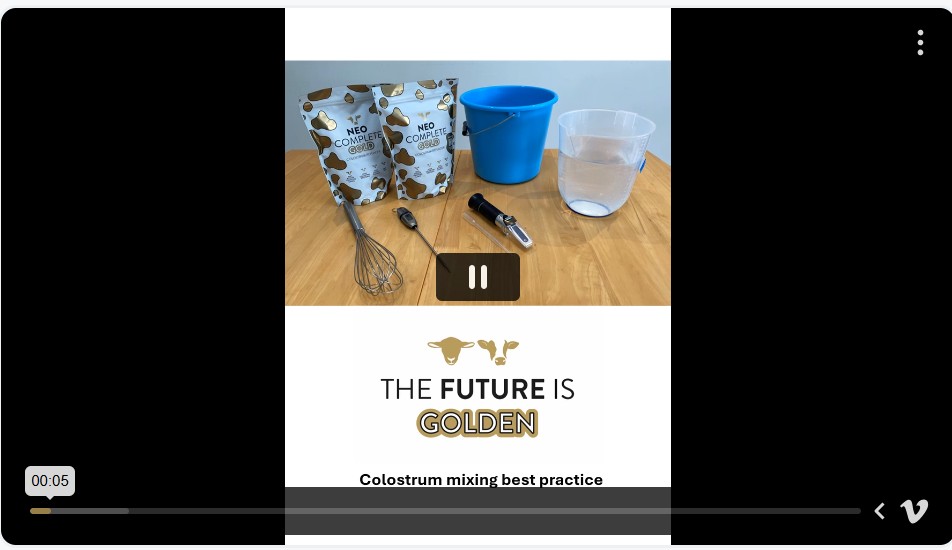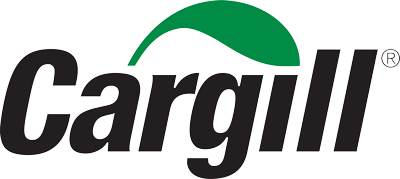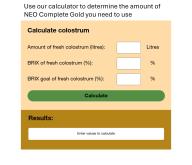Introducing the NEW Cargill NEO Colostrum Range!
100% naturally derived colostrum replacer & supplement designed with your herd's future in mind.
Supplying crucial early-life nutrition and high levels of bovine protein and fat.
Colostrum is the first milk produced after a normal dry period by the mammary gland and is an essential part of the newborn calf’s survival. As the first food source, colostrum provides essential nutrients to increase metabolism, stimulate digestive activity and passive immune protection essential for keeping the calf healthy. The quality, quantity, timing and cleanliness of colostrum feeding are major factors affecting calf morbidity and mortality.


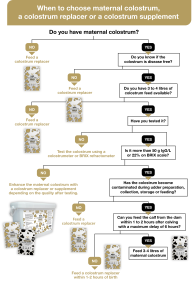
Calf immune system and colostrum
Colostrum is the first milk produced after a normal dry period by the mammary gland and is an essential part of the newborn calf’s survival. As the first food source, colostrum provides essential nutrients to increase metabolism, stimulate digestive activity and passive immune protection essential for keeping the calf healthy. The quality, quantity, timing and cleanliness of colostrum feeding are major factors affecting calf morbidity and mortality.
The syndesmochorial placenta in ruminants separates the maternal and foetal blood supplies preventing the in-utero transmission of immunoglobulins (antibodies) between the dam and calf during pregnancy. This results in the calf being born with a naïve or immature immune system and is entirely dependent on the consumption of colostrum and absorption of immunoglobulins for the transfer of passive immunity and subsequent immune development. The quick delivery of adequate, high quality, clean colostrum in the first few hours after birth is the most important management factor determining the health and survival of calves.
During the first 24 hours after birth, the calf can absorb immunoglobulins directly from the gut into the bloodstream without digesting them. This type of protection from dam to calf via colostrum is called “passive immunity” and this protects the calf until its own immune system becomes fully functional. The gap between passive immunity provided by colostrum and the calf’s own immunity creates a period where the calf is at greater risk of illness.
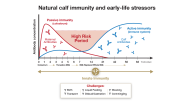
The primary bovine colostrum antibodies are immunoglobulin G (IgG ~ 80 to 85 %), immunoglobulin A (IgA ~ 8 to 10 %), and immunoglobulin M (IgM ~ 5 to 12 %). IgG is the most crucial immunoglobulin for passive immunity in calves, providing protection against a wide range of pathogens and is absorbed into the calf’s bloodstream to offer systemic protection. IgA is primarily found in mucosal secretions like saliva and colostrum and helps protect the calf’s gut lining from infection. IgM is involved in the initial immune response during the calf’s life and is found in higher concentrations in serum. Although the specific concentration of immunoglobulins can vary between cows, IgG is the most dominant type and lasts the longest in the calf’s bloodstream.
When acceptable levels of IgG are fed and absorbed by the calf, successful transfer of passive immunity (TPI) occurs. Successful transfer of passive immunity provides protection for the calf from pathogens and is associated with a serum IgG concentration of more than 10 g/L 24 to 48 hours after birth. High serum IgG concentration is associated with reduced morbidity and mortality, improved health and growth, long term productivity benefits, reduced antibiotic use and enhanced immune system development.
Failure of transfer of passive immunity (FPTI) occurs if the calf is not fed an acceptable quality and quantity of clean colostrum in a timely manner and is associated with a serum IgG concentration of less than 10 g/L 24 to 48 hours after birth. Low serum IgG concentration is associated with increased morbidity and mortality, reduced growth and performance, long term productivity setbacks, increased risk of specific diseases, increased reliance on antibiotics and economic losses for producers.
Colostrum feeding standards have been developed based on their importance to immune system development and there are five key components to successful colostrum feeding management:
- Quality
- Quantity
- Quickly
- Cleanliness
- Quantify
Colostrum replacers and supplement
Colostrum is the newborn calf’s first feed supplying concentrated nutrients and essential components that support early development. Effective colostrum management is critical as it supports calf vitality, growth and long-term performance. Whilst the supply of high quality, clean maternal colostrum provided quickly within 1 to 2 hours after birth is always the preferred option, there are times when availability, biosecurity, consistency, disease or quality can be a challenge. In these situations, producers have access to alternative tools to help manage variability and maintain consistency in calf rearing. Colostrum replacers and colostrum supplements are valuable tools to support calf immunity and offers flexibility to support early life feeding practices when maternal colostrum alone may not be sufficient.
Although commercially available colostrum replacers and colostrum supplements can play an important role in calf health, it is necessary to understand the differences in these products based on their formulations and how to use them for optimum results. It is important to know the quality of the colostrum to be able to determine whether a replacer or supplement is recommended for a given situation. In addition, carefully read and follow the manufacturer’s instructions for use as products may vary in how they are mixed and the recommended number of feedings.
Multiple published research trials have reported acceptable levels of serum IgG and total protein in calves fed various colostrum replacer products as a complete substitute supporting their effectiveness in increasing immune protection in calves. In situations of high morbidity and/or mortality, serum IgG tests may be recommended to determine the prevalence of failure of passive transfer and the efficacy of colostrum management in the herd.
Used as an alternative or an addition to maternal colostrum, colostrum replacers and colostrum supplements are valuable tools for calf rearing systems. They do not replace the importance of good colostrum management practices but provide flexibility and reassurance to producers when challenges arise. By having these options available, producers can ensure their calves receive safe, consistent, quality care in the first few hours of life and beyond, even when the supply of maternal colostrum is less than ideal.
